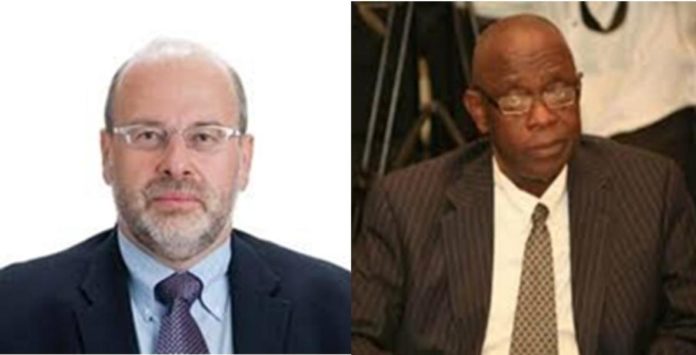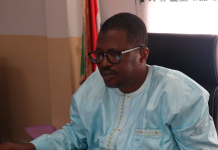By Awa B. Bah
“Emerging from two decades of autocratic rule, the Gambia remains a fragile state with significant development and infrastructure gaps,” said Jaroslaw Wieczorek, the International Monetary Fund (IMF) team leader. The IMF Team Leader made these remarks on Wednesday May 9th, at a joint press conference with the Minister of Finance in Banjul, to release the preliminary findings of their visit to the Gambia.
The Gambia, he said, is ranked 173 out of 187 countries in the UNDP’s 2016 human development index and that poverty still remains pervasive and stagnant.
It could be recalled that the IMF staff team led by Jaroslaw Wieczorek arrived on the May 3rd 2018, to assess the implementation of the Gambia’s Staff Monitoring Program, SMP1.This program was built with IMF assistance, focusing on the economic and financial policy commitments of Government, for the remainder of the SMP1, which has been extended to September 2018, to enable the completion of the program reform agenda.
The team has met with the Minister of finance, the Central Bank Governor, senior Government and public enterprise officials, representatives of the private sector, banks and heads of civil society organisations and development partners, including the visiting World Bank executive director.
According to the IMF team leader, debt vulnerability remains high and ensuring debt sustainability will require firm fiscal discipline, the mobilization of sizable and sustained external grant support with strict limitation of reliance on external borrowing, even on concessional terms; that the private sector is key to achieving sustained growth and job creation. Efforts he said, are needed to leverage the restoration of investor confidence and pave the way for enhanced private sector participation, including the improvement of the business regulatory environment. He said strengthening the rule of law, governance and anti-corruption efforts are central for the success of the Gambia’s economic transformation. This he said, requires enhanced transparency through improved data quality and timelines.
Gambia’s economic recovery he said, is gaining traction as economic growth rebounded to 3.5 percent in 2017, from just 2.2 percent a year earlier, owing to a stronger agricultural season and a pickup in tourism, trade and transportation. Headline inflation he said, declined from a peak 8.8 percent in January 2017, to 6.5 percent in March 2018, reflecting the stabilization of the dalasi and a rebound in food supply. He said significant external financial support boosted international reserves and allowed Government to reduce its reliance on domestic borrowing. According to the IMF team leader, in 2018, GDP growth is expected to rise to 5-5 1/2 percent, and inflation is projected to drop to about 51/4 percent.
The Gambia’s debt stock he said has risen further to about 130 percent of GDP at the end of 2017, of which more than half is owed to external creditors, mainly due to legacy issues including faster disbursements of previously contracted loans, and the recognition of external arrears incurred by the former administration, and Government’s assumption of State Owned Enterprise liabilities. Maintaining debt sustainability, he said, will necessitate refraining from contracting new Government debt or contingent liabilities, before additional fiscal and borrowing space is achieved and leveraging more private investment; that strengthened fiscal discipline and domestic revenue mobilization, are needed to reduce debt vulnerabilities.
The reform of State Owned Enterprises SOEs according to the IMF Team Leader, remains critical; that efforts are needed to strengthen the financial oversight of SOEs through special multiyear audits and enforcement compliance, with monthly, quarterly and annual reporting requirements.
The team leader recommends that the central Bank maintains flexible exchange rate policies and take concrete steps to strengthen the monetary policy framework to help ensure price stability; that the establishment of an interest rate corridor for the policy rate, will help to ensure monetary conditions are consistent with the objective of keeping inflation at or below 5 percent. On behalf of his team, he commended the authorities for their openness and excellent cooperation on the fruitful discussions accorded him and members of his team. He assured their continued close cooperation during the period ahead.
On his part, Finance and Economic Affairs Minister Amadou Sanneh, said most people would not understand their engagement with the IMF and the World Bank. But that they have programs to assist the Gambia to face the challenges they have most of which is the legacy of the past regime. The Gambia he said, is going through a very difficult period and they did not have adequate resources to meet the challenges. Sanneh said Government has reached out to its partners and Gambians should be proud that the international community has responded positively to assist the Gambia. The World Bank he said responded last year with a budget support together with the United Kingdom; that they have recently signed 5 million dollars with the Africa Development Bank (ADB).
‘‘With this goodwill, Gambia has to tighten its belt and do all the necessary reforms needed to put the country economy on a sustainable footing,’’ he said. Some of these reforms he said, cuts across all sectors of the country and will create a bright future for Gambians including those that are affected. He thanked the IMF team and assured them of Government’s full cooperation.



















